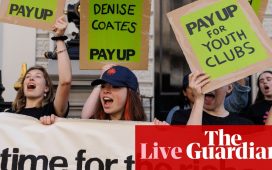Introduction: UK consumer confidence weaken ahead of Budget
Good morning, and welcome to our rolling coverage of business, the financial markets and the world economy.
UK consumers are in a “despondent mood” ahead as households brace for tax rises in the Budget next week, amid fears that Britain could be entering a “vibecession”.
Research firm GfK’s monthly survey of consumer morale shows confidence has slipped this month, to -21 points, the joint lowest this year.
It found that households are gloomier about the general economic situation of the country during the last 12 months, and also over the next year.

Neil Bellamy, consumer insights director at GfK, reckons consumers are ‘holding their breath” ahead of next Wednesday’s budget statement, explaining:
“Consumer confidence fell one point this month to -21, taking the score back down to the level last seen in March this year. Also falling one point are both personal financial situation over the last 12 months and general economic situation over the next 12 months.
The largest drop though was in our view of the general economic situation over the last 12 months, down five points to -42. On the plus side, the major purchase index rose two points and future personal financial expectations by one point. As the Budget statement looms, consumers are in a despondent mood despite a fall in the headline rate of inflation. This month’s Consumer Confidence Barometer paints a picture of people holding their breath to see what’s in store for them on 30th October.”

Although Labour ruled out increasing taxes on “working people”, various revenue-raising measures could be in the chancellor’s sights, such as capital gains tax (CGT), inheritance tax, employer national insurance contributions, and fuel duty.
A similar poll from PwC yesterday showed the same picture. Its consumer sentiment index dropped to the lowest level in 2024, led by “notable declines” among those over 65 and the lowest socioeconomic groups.
Over 70% of people polled by PwC are planning to make short-term spending cutbacks, and more households plan to spend less on Christmas presents and celebrations than those who say they’ll spend more.
The drop in confidence comes despite the easing of cost of living pressures recently, with inflation dropping to 1.7% last month.
Lisa Hooker, PwC’s leader of industry for Consumer Markets, says:
“Being first recognised in the US, we are seeing the impact of ‘vibecession’ in the UK where, despite falling inflation and interest rates and consumers being better off, sentiment has started to fall again.
Whether the starting point was the unrest across the UK in early August, the unseasonably awful summer weather or a combination of several factors, the typical post-election honeymoon vanished quickly, to be replaced by trepidation, particularly about the upcoming budget.”
The mood isn’t much cheerier in the business world, either.
Yesterday, the CBI reported that sentiment across the manufacturing sector fell in October, at the fastest pace in two years.
According to data provider S&P Global, confidence across the private sector has dipped to its lowest since November 2023.
The agenda
-
9am BST: Eurozone consumer inflation expectations
-
9am BST: IFO survey of German business confidence
-
11.30am BST: Bank of Russia sets interest rates
-
1.30pm BST: US durable goods orders for September
-
3pm BST: University of Michigan poll of US consumer confidence
Key events
Consumers win landmark legal decision against motor finance lenders
The UK Court of Appeal has ruled in favour of three car buyers in a landmark case over the supply of motor finance.
In a significant ruling, the Appeal Court has concluded that motor dealers acting as credit brokers have a fiduciary duty to their customers.
The case centred on the practice where motor dealers would arrange finance so a customer could buy a car on credit, and receives a commission from the lender.
The three complainants were student nurse Amy Hopcraft, factory supervisor Marcus Johnson, and Andrew Wrench, dubbed “a postman with a penchant for fast cars” by the Court of Appeal. The trio argued that the car dealers owed them a duty to provide impartial information, advice or recommendation, and sought the return of the commission paid to them as credit brokers.
And the Court of Appeal has backed their case, saying:
The dealers were the sellers of the cars, but they were also acting as credit brokers on behalf of the claimants. In the latter role, their task was to search for and offer the customer a finance deal from their panel of lenders which was suitable for their needs and competitive.
In some cases they undertook to find the best deal or the one which was most suitable for the customer.
The ruling could open the door for many more consumers to seek redress; the UK’s Financial Conduct Authority has been conducting its own inquiry into the motor finance sector.
Shares in Close Brothers, the financial services company which provided the finance to Hopcraft, have tumbled by around 20% this morning.
Close Brothers has told the City that it “disagrees with the Court’s extension of the existing case law in this area”, and plans to appeal this decision to the UK Supreme Court.
In the meantime, it is also temporarily pausing the writing of new UK motor finance business while it reviews its processes to ensure they comply with today’s ruling.
Kavon Hussain, principal of Consumer Rights Solicitors who brought the cases to the Court of Appeal, reckon that billions of pounds of commissions could be clawed back.
Hussain says:
Unknown to customers, lenders systematically incentivised car dealers acting as credit brokers to place finance with them by paying commissions that were not disclosed to the consumer.
“These hidden commissions paid to dealers meant that the consumer could pay anything from a few hundred pounds to many thousands extra to a lender through interest payments, for the lender to then pay this to the dealer.
“It was, and still is, a broken system which rewarded the lenders paying the largest commission to the ultimate detriment of the normal man in the street who went to buy a car on finance.
“This Court of Appeal judgement is going to affect every lender in the market. We already have a substantial amount of clients with claims waiting to go.”
Although UK borrowing costs have risen this week, in the run-up to the budget, there’s no sign of a mini-budget-style “Moron Premium” being applied to gilts.
That suggsts the markets are pretty confortable with Rachel Reeves’s fiscal plans, at this stage anyway.
Simon French, chief economist at investment bank Panmure Liberum, explains all in this thread:
There are frustratingly polarised views on how much Gilt markets are signalling unease with the recent evolution of UK fiscal policy. Lets have a go at establishing the nuance coming out of the market data. A 🧵….
— Simon French (@Frencheconomics) October 25, 2024
Different parts of the UK sovereign curve are giving different signals – but if we take the 10-year benchmark then the overall trend since election day for Gilts has tracked US Treasuries. Any UK yield premium is not immediately obvious. pic.twitter.com/c16inNzTXs
— Simon French (@Frencheconomics) October 25, 2024
This is in contrast to 2022 when the pattern between Gilts & Treasuries most certainly did break down. A very clear moron premium (not my term – @darioperkins is the master) emerged, briefly. So at this stage the Gilt market is not telling you it is uncomfortable with UK fiscal… pic.twitter.com/rNpEXXmNOy
— Simon French (@Frencheconomics) October 25, 2024
Well not so fast. Across the curve the Gilt story is a little different, particularly at the short end. Now this is not necessarily a fiscal issue, monetary policy has been noticeably more hawkish from the BoE vs ECB/Fed so could simply be hangover of pre-election supply side/… pic.twitter.com/S5M0f3dkBX
— Simon French (@Frencheconomics) October 25, 2024
But monetary policy is not made in a vacuum and some of the MPC’s more hawkish tones may be a feedback loop from anticipating a more expansionary fiscal stance post-Budget. Don’t expect them to say that as MPC convention is to only condition views/forecasts on announced govt…
— Simon French (@Frencheconomics) October 25, 2024
So whilst the Shadow Chancellor is being a little bit disingenuous warning of Treasury advice which warns of higher interest rates (because a CDEL expansion has a v different impulse to a RDEL/AME/CDEL split) – see analysis:https://t.co/plUr1l38ej there are kernels of valid…
— Simon French (@Frencheconomics) October 25, 2024
My conclusion is that the Gilt market is generally relaxed at the UK’s fiscal tweaks, but with a small uncertainty yield premium on fears that the looser stance of capital will slip into resource spending. This makes Darren Jones’ (CST) “guardrails” comments, and focus on value…
— Simon French (@Frencheconomics) October 25, 2024
Shares in the fashion company behind Versace and Jimmy Choo have almost halved in pre-market trading, after a US judge blocked its merger with handbag maker Tapestry.
Tapestry had planned to acquire Capri Holdings, which also owns the Michael Kors brand, in an $8.5bn deal. But the plan has been thwarted, after a federal judge agreed with regulators that the deal would hurt competition in the handbag industry.
Capri Holdings $CPRI shares plummeted 46% after a federal judge blocked its $8.5B sale to Tapestry $TPR. The judge ruled that the merger would be anticompetitive, granting the Federal Trade Commission’s motion for a preliminary injunction. Tapestry plans to appeal the decision.…
— MasterUp Trading Stocks, Crypto, Forex, Fut, ETF (@Tradinguru55) October 25, 2024
Pound on track for worst month since September 2023
The pound is set for its worst month in over a year against the dollar.
Sterling has lost 2.9% so far during October, which would be its weakest month against the greenback since September 2023.
The pound began October at $1.3370, but is currently trading almost four cents lower at $1.298.
It weakened as traders anticipated faster interest rate cuts from the Bank of England, and nervous investors sought the safety of the US dollar given geopolitical fears.
Uncertainty over next week’s budget may also be hurting the pound. But Kathleen Brooks, research director at XTB, reckons it’s mainly about the stronger dollar.
The backdrop to this Budget is one of a weakening pound and rising bond yields. Over the past month, GBP/USD has fallen more than 3%, as the dollar has dominated the G10 FX space.
This move lower in GBP/USD, is mostly down to dollar strength rather than weakness in sterling, which has performed in the middle of the G10 FX pack for the past month.
London’s stock market is ending the week in subdued fashion, with the FTSE 100 index dipping by 0.07% (or 5 points, to 8263 points) and the smaller FTSE 250 flat.
AJ Bell investment director Russ Mould says:
“The FTSE 100 dipped lower on Friday morning, undone by some weakness in the energy and housebuilding sectors.
This followed some pretty dire figures on consumer confidence with households in a downbeat mood ahead of next week’s Budget and the long-heralded ‘difficult decisions’ it might contain.
Fewer businesses are being created – or closed down – in the UK than last year, new data from the Office for National Statistics shows.
The ONS reports that the number of businesses created in July-September 2024 was 3.7% lower than in Quarter 3 2023.
There was a decrease in creations in 13 out of 16 main industrial groups, with the most significant decreases coming from the construction, and transport and storage industries.
Business creations in Quarter 3 (July to Sept) 2024 were 3.7% down on Quarter 3 2023, with drops in 13 out of 16 main industrial groups.
The most significant falls came from construction and transport and storage.
Read more ➡️ https://t.co/yRzmjpKY7C pic.twitter.com/gPYsxE2Szy
— Office for National Statistics (ONS) (@ONS) October 25, 2024
Business closures fell by 4.2% year-on-year, the ONS adds.
Better news from Germany: business morale has picked up this month.
The Ifo institute said its business climate index increased to 86.5 in October, up from 85.4 last month.
Analysts polled by Reuters had expected a reading of 85.6, so this is better than forecast – but still weak….
Germany October IFO:
Index 86.5 (est 85.6, last 85.4)
Current Assessment 85.7 (est 84.4, last 84.4)
Expectations 87.3 (est 86.9, last 86.4 from 86.3)Like PMIs, IFO recovered slightly from depressed levels, but remaining in weak territory, coincident with a economic contraction pic.twitter.com/Z3dUiiGS1b
— Mario Cavaggioni (@CavaggioniMario) October 25, 2024
Goldman Sachs predicts tax and spending increases in the budget
Analyst at Goldman Sachs predict Rachel Reeves will announce higher spending in next week’s budget – partly to protect departments from cuts – funded by a higher tax take.
In a research note, GS’s James Moberly says:
We expect next week’s (October 30th) Autumn Budget to see the government upgrade current spending by around £30bn per year (0.9% of FY2029 GDP) by the end of the forecast horizon given in-year overspends and the need to revise up the spending growth rate to prevent real-terms cuts to unprotected departments’ budgets.
Moberly explains that most of this increase will be funded by higher revenues, as the chancellor is committed to balancing the current budget.
We expect the government to announce tax increases worth roughly £25bn per year (0.75% of FY2029 GDP) by the end of the forecast horizon.
In addition to the manifesto pledges on tax, the government could raise revenues through reforms to capital gains and inheritance tax, removing the National Insurance exemption on employer pension contributions, and extending the freeze on personal income tax thresholds.
Moberly adds that changing the UK’s debt metric to public sector net financial liabilities (PSNFL), as we expect, would give Reeves around £50bn of headroom while still ensuring debt falls as a share of GDP five years ahead.
That increase will come gradually, he predicts:
We think that the Chancellor would be very unlikely to use all the resulting fiscal space and would instead leave a much larger margin of headroom against the debt rule. Nonetheless, with the debt rule unlikely to bind, there is considerable uncertainty around exactly how much public investment could increase.
We think that an increase of around £25bn a year (0.75% of FY2029 GDP) by the end of the forecast horizon relative to the Spring Budget plans is most likely. That said, we think that this increase would be phased in gradually over several years.
Profits have tumbled at German luxury carmaker Mercedes-Benz, as demand from China and its home market both weaken.
Mercedes-Benz has reported a 53% drop in net profits in the last three months, to €1.719bn, in a quarter which saw “a challenging market environment and fierce competition, particularly in China”.
Group revenues fell 6.7%, including a 16.6% drop in China – and a near-25% decline in Germany.
Harald Wilhelm, chief financial officer of Mercedes-Benz Group, isn’t sugar-coating the figures, saying:
The Q3 results do not meet our ambitions. Nonetheless Mercedes-Benz continues to generate solid cash flows even in challenging times. We are taking a prudent view about market evolution going forward and we will step up all efforts on further efficiency increases and cost improvements across the business.
Rachel Reeves’s plans to shake up the UK’s fiscal rules to allow more borrowing for investment are not rocking the bond market today.
The prices, and thus the yields, on UK government debt are basically unchanged this morning.
There was a small rise in yields yesterday, as traders anticipated higher borrowing, but that wasn’t a major move either.
NatWest shares highest since 2015 after rise in profits
NatWest has rounded off the UK bank reporting season by beating City expectations, sending its shares to their highest level in almost a decade.
NatWest reported a 26% rise in pre-tax operating profits for the third quarter of the year to nearly £1.7bn, up from £1.3bn.
Chief executive Paul Thwaite says that customer activity is increasing, while defaults remaining low:
As the UK’s biggest bank for business, and one that serves millions of households, NatWest Group plays a key role in driving economic growth across the UK.
Throughout the third quarter of 2024, we have grown our lending, helping customers to buy or remortgage their homes or to start and grow their businesses.
NatWest has bumped up its forecasts, now predicting a return on tangible equity greater than 15% this year, up from a previous forecast of 14%.
Shares have jumped over 4%, trading as high as 378.9p, the highest since 2015.
They’re still a long way below their pre-financial crisis levels, though, when the company was known as Royal Bank of Scotland, and was bailed out by the taxpayer.
Minister defends fiscal rule changes after Persnuffle kerfuffle
Government ministers are out defending Rachel Reeves’s plan to change the measure used for Britain’s debt target, to allow billions of pounds more borrowing within the fiscal rules.
As we covered yesterday, the chancellor confirmed that next week’s budget will include a new method for assessing the UK’s debt position, during her visit to the International Monetary Fund’s Annual Meeting.
Reeves didn’t confirm what the new measure would be, but the Guardian has been told by a senior government source that she will target public sector net financial liabilities (PSNFL), a measure which recognises the value of investing in assets.
Yesterday’s announcement sparked a row (dubbed the ‘persnuffle’ kerfuffle by the Independent), with former chancellor Jeremy Hunt claiming extra borrowing could push up borrowing costs, hurting households with mortgages.
This morning, Treasury secretary James Murray has insisted that Reeves’s plan was in line with Labour’s manifesto promises, and would lead to more investment.
Murray told Times Radio:
“What the Chancellor was setting out is what we pledged to do in our manifesto around fiscal rules.”
He added:
What the Chancellor has said is the second of her fiscal rules, the investment rule, will make sure that we measure debt differently to recognise the value of assets, not just the cost of investment.
“Because what’s crucial is that we have investment in this country that will underpin greater growth in the years ahead.”
Thames Water’s bonds are rising in early trading, after it announced a proposal to extend its liquidity runway.
However, prices remain low – reflecting the fact that Thames credit rating is at junk levels.
Reuters has the details:
The company’s April 2027 euro-denominated bond rose 0.27 pence in price to 78.316 pence, the highest since Aug 21, on the Tradeweb platform.
Its May 2027 sterling-denominated bonds rose 0.279 pence to 13.474 pence on Tradeweb.
Thames Water proposes £3bn liquidity plan
Struggling utility Thames Water has announced plans for a £3bn financial lifeline to help it avoid collapse.
Thames told the City this morning that the proposal – to raise money from its creditors – would improve its “liquidity runway” until October 2025, with the possibility of a further extention to May 2026 if regulators agreed.
Under the plan, some of Thames’s creditors would provide an initial tranche of £1.5bn, with the possibility of another £1.5bn once Ofwat has made its “Final Determination”, laying out how much Thames can raise bills by.
In a boost for Thames, which is struggling under a £15bn debt pile, the plan would extend the maturities of all Class A Debt and Class B Debt by two years.
The company says that creditors representing around £6.7bn of its Secured Debt are backing the plan. It is seeking the support of more creditors, through a transaction support agreement announced this morning.
Yesterday, Reuters reported that a group of Thames creditors were proposing an alternative liquidity package to give the company more time to restructure its debts.
Last month, Thames admitted it could run out of cash as soon as December.
Today, the company say it is working hard to get onto a stable financial footing.
Sir Adrian Montague, Chairman of Thames Water said:
“The Board and leadership team remain focused on stabilising the business and today’s announcement is an important step in the process to increase its long-term financial resilience.
There will be further stages and we will continue to work collaboratively with our many stakeholders as we look to attract new equity into the business and seek a final determination that enables the delivery of our ambitious business plan for the next five years.”
Introduction: UK consumer confidence weaken ahead of Budget
Good morning, and welcome to our rolling coverage of business, the financial markets and the world economy.
UK consumers are in a “despondent mood” ahead as households brace for tax rises in the Budget next week, amid fears that Britain could be entering a “vibecession”.
Research firm GfK’s monthly survey of consumer morale shows confidence has slipped this month, to -21 points, the joint lowest this year.
It found that households are gloomier about the general economic situation of the country during the last 12 months, and also over the next year.

Neil Bellamy, consumer insights director at GfK, reckons consumers are ‘holding their breath” ahead of next Wednesday’s budget statement, explaining:
“Consumer confidence fell one point this month to -21, taking the score back down to the level last seen in March this year. Also falling one point are both personal financial situation over the last 12 months and general economic situation over the next 12 months.
The largest drop though was in our view of the general economic situation over the last 12 months, down five points to -42. On the plus side, the major purchase index rose two points and future personal financial expectations by one point. As the Budget statement looms, consumers are in a despondent mood despite a fall in the headline rate of inflation. This month’s Consumer Confidence Barometer paints a picture of people holding their breath to see what’s in store for them on 30th October.”
Although Labour ruled out increasing taxes on “working people”, various revenue-raising measures could be in the chancellor’s sights, such as capital gains tax (CGT), inheritance tax, employer national insurance contributions, and fuel duty.
A similar poll from PwC yesterday showed the same picture. Its consumer sentiment index dropped to the lowest level in 2024, led by “notable declines” among those over 65 and the lowest socioeconomic groups.
Over 70% of people polled by PwC are planning to make short-term spending cutbacks, and more households plan to spend less on Christmas presents and celebrations than those who say they’ll spend more.
The drop in confidence comes despite the easing of cost of living pressures recently, with inflation dropping to 1.7% last month.
Lisa Hooker, PwC’s leader of industry for Consumer Markets, says:
“Being first recognised in the US, we are seeing the impact of ‘vibecession’ in the UK where, despite falling inflation and interest rates and consumers being better off, sentiment has started to fall again.
Whether the starting point was the unrest across the UK in early August, the unseasonably awful summer weather or a combination of several factors, the typical post-election honeymoon vanished quickly, to be replaced by trepidation, particularly about the upcoming budget.”
The mood isn’t much cheerier in the business world, either.
Yesterday, the CBI reported that sentiment across the manufacturing sector fell in October, at the fastest pace in two years.
According to data provider S&P Global, confidence across the private sector has dipped to its lowest since November 2023.
The agenda
-
9am BST: Eurozone consumer inflation expectations
-
9am BST: IFO survey of German business confidence
-
11.30am BST: Bank of Russia sets interest rates
-
1.30pm BST: US durable goods orders for September
-
3pm BST: University of Michigan poll of US consumer confidence








